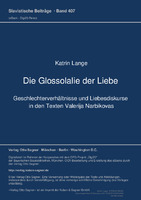Die Glossolalie der Liebe
Geschlechterverhaeltnisse und Liebesdiskurse in den Texten Valerija Narbikovas
Abstract
Love discourses, according to the basic thesis of the work, are figurative in Narbikova's texts as constituting the text. Their characteristic is the shift from (love) semantics to a specific (love) rhetoric. Love discourses in the textual presentation are no longer constituted through the traditional narration of love stories or stories about love, but through a practice of love-speech. As a result, language no longer functions as a means of description, but itself becomes the object of description and reflection. Examining this phenomenon in conjunction with the theme of love discourses is the main interest of the work. Liebesdiskurse, so die Grundthese der Arbeit, figurieren in Narbikovas Texten als textkonstituierend. Deren Charakteristikum ist die Verschiebung von (Liebes-)Semantik hin zu einer spezifischen (Liebes-)Rhetorik. Liebesdiskurse werden in der textuellen Darstellung nicht mehr über das traditionelle Erzählen von Liebesgeschichten bzw. Geschichten über die Liebe konstituiert, sondern durch eine Praxis des Liebe-Sprechens. Sprache fungiert demzufolge nicht mehr als Mittel der Beschreibung, sondern avanciert selbst zum Gegenstand von Beschreibung und Reflexion. Der Untersuchung dieses Phänomens im Konnex mit dem Thema der Liebesdiskurse gilt das wesentliche Interesse der Arbeit.
Keywords
Love discourses; semantics; rhetoric; Die Liebesmodelle Tolstojs und Dostoevskijs; Geschlechterverhältnisse; Glossolalie; Lange; Liebe; Liebesdiskurse; Liebe-Sprechen; Mutterschaftsimaginationen; Narbikovas; Prozessualität; Sprache und Autorschaft; Texten; ValerijaDOI
10.3726/b12673ISBN
9783954790340OCN
1083023494Publisher website
https://www.peterlang.com/Publication date and place
Bern, 2001Series
Slavistische Beitraege, 407Classification
Language and Linguistics


 Download
Download